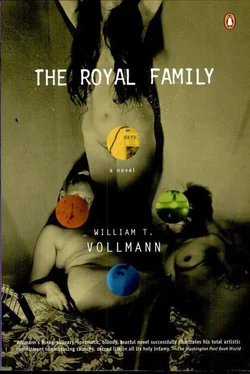I know the feeling, said Tyler, walking on. Gnats and mosquitoes boiled about his arms.
He came to the far side, and clambered down beneath the bridge where the air was heavy and chilly and a fanged face had been painted on the concrete. He heard a crackling noise. A man came out of the weeds hitching up his trousers and said to Tyler: You fishing?
That describes it pretty well.
Where’s your rod?
Hidden away, said Tyler.
Oh, I love them German browns, said the man. They’re not native fish, but they offer a helluva lot of fight. I go after ’em with anchovies or even rebels. Sometimes I pan for gold.
Uh huh, said Tyler. So you’re looking, too.
Are you a Christian? asked the man.
Only Jesus knows the answer to that, Tyler replied.
Yep, said the man. You can be walking down the road, pickin’ your nose, and it’s still okay to call on Jesus because He loves you; He hears you. You can just say, Jesus, I don’t need nothin’ but I love you.
Is Jesus in all the waste places? Tyler asked.
Friend, Jesus is everywhere.
Even where Cain’s hiding?
No question of it. That old murdering Cain he can’t run no more.
And how about the Land of Canaan?
I ain’t never been there, said the man. But Jesus has. He’s everywhere.
And how about the idols? Tyler went on in a grating tone which startled even himself. — How about them, huh? And how about the Whore of Babylon? How about the Queen of the Whores? Has Jesus taken them all over, too?
There’s always two voices whispering in every man’s head, the fisherman said. One’s Jesus’s voice. And the other — well, friend, you know who the other is. Which voice is whispering in your head right now, bro?
The Queen. And Dan Smooth. And sometimes Irene—
Friend, I’m going to pray over you right now. In just a minute. You have a cigarette?
Where’s the best place to sleep around here? said Tyler.
Just go up that path there and you’ll see plenty of hollows where those bushes are. They look impossible to get into, but if you lay down in there, you’ll find lots of good canopy so no rain can be botherin’ your head. Just lay down there and give some thought to Jesus.
Thanks, said Tyler. He felt a tightness in the back of his head, bone pressing urgently through along the arc where Dr. Jasper’s circular saw had gone to take out Dan Smooth’s brain. The orange sky’s image slowly dulled in the river.
Well? the man said.
Well what?
You gonna listen to Jesus?
Can’t get away from Jesus, that’s for sure, Tyler bitterly replied. Old Jesus has certainly won the victory.
Your words give me joy, friend, the man said. You know why? I used to have a family. Now I’m divorced. I’m an ex-con; I’m an ex-felon. All I have now is Jesus.
Yeah, I know you do, said Tyler.
You got a cigarette?
I only smoke rock.
You might be able to score something down the river there, where that smoke’s coming up through the trees…
All right. Good to meet you, said Tyler, heading on into moist darkness scented with anise. The crickets sang. His mother had hated crickets. He remembered once coming home — it must have been in around 1970—and when they pulled into the driveway his mother screamed because the porch was black with crickets. She stayed in the car until he got a broom from the garage and swept then all away…
We call this place Coffee Camp because whenever you come by, we’ll give you coffee if we have it. If we don’t, we’ll boil some leaves, or dead cats, or whatever.
Oh, shut up, said Dragonfly. To Tyler he said: That’s just Donald talking.
I’m Donald, said Donald. What’s your name?
Henry, said Tyler. Pleased to meet you.
At Coffee Camp, at least you won’t go thirsty! cried Donald with black-toothed enthusiasm. You want me to boil some leaves or something?
Shut up, Donald, said Dragonfly.
That’s all right, Tyler said, seeing by their firelight a toilet paper roll on a stump, two bumpy foam mattresses, a lovingly potted weed not yet dead, some blankets, a half-full pack of cigarettes lying on the sand.
He’s retarded, Dragonfly explained. He’s a moron. I kind of look after him. His Mama gave birth to him in an outhouse. By the time they dug him out of the shithole, he was half suffocated. They say it affected his brain.
How often do you guys actually serve coffee around here? said Tyler, suddenly wanting some.
Never. When we get coffee — which isn’t very often — we drink it right up. Why? You have some? Donald would sure be tickled.
Don’t believe I do.
You won’t go thirsty, Donald repeated.
Sounds like a regular Java palace around here.
No, stranger, said Donald. It’s not Java Camp. It’s only Coffee Camp.
They sat in silence for a while. Just above Tyler’s head, the moon bulged and burned through the foliage. From across that river so beautifully cool with wrinkles of night came the greensmoke-smell of a campfire which resembled a quivering yellow diamond. Somewhere near or far, a flashlight swung at ankle height, swung through the crackling bushes. He heard a dog’s bark. Then the moon burst through the bushes, and the world was bright.
My name’s Dragonfly, said Dragonfly. You looking for a place to camp? Not that I’m meaning to meddle or nothing.
Yeah, in fact I am.
You can sleep under that tree if you want.
All right.
Hey, Dragonfly, said Donald. What’s his name again?
My name’s Henry, said Tyler.
Henry, can I tell you something?
Sure, Donald. You go right ahead.
I just wanted to tell you that whenever we make coffee here at Coffee Camp, it feels just like Sunday. When the coffee starts to boil, Henry, well, I–I feel like I’m in church. I wanted to tell you that.
Thanks for letting me know, said Tyler, unrolling his blanket.
That’s all he talks about, Dragonfly explained. And you know the pisser? He don’t even like the taste of coffee!
Across the river, he could hear his fellow souls breaking branches for their fire, with a noise like exploding firecrackers.
What’s your name again? said Donald.
Cain, said Tyler. Don’t you see the mark on my forehead? Now, Donald, I want you to listen to me. I’m running away, and I don’t want to talk to anybody anymore. Now let me sleep.
When he awoke the next morning, an hour or so after dawn, it was already as hot as black, creosoted railroad gravel on a Sacramento summer’s day — windy over the green water, the steel bridge walkway trembling under his tread. It might have been the third anniversary of Irene’s suicide, but he was less than entirely certain; perhaps he was finished with dates. He saw a crew of homeless men sitting under a tree with their dog. He nodded, but they stared him down. Coming to the cagelike maze between railroad cars, he found no signs of any impending departure from Coffee Camp. His prospects remained unchanged, at least until he ended up on Dr. Jasper’s table, and he was hot and sweating. To further his education he swung himself up into the chest-high cave of an open railroad car, inside which a treasury of initials and dates had been scribbled, marked and carved upon hurtfully hot metal walls. The car was hollow and vast. He felt like a single grain of salt in an empty shaker. The question he had to decide consisted of two parts. The first was: Should I live or die? The second was: How should I live or die? He found himself unable to conclude anything. Seeking to flee the glary illumination thus cast upon his freedom, he boarded a passing memory-train, revisiting first his brother’s late wife, who admitted to being afraid of so many things; when she was young, Irene used to wear her hair in a bun until a neighborhood boy told her that if she did that, spiders could nest inside and in the night time they’d crawl down and eat her eyes. — I used to have all these ideas, she’d said to Tyler once — at which John, gazing good-humoredly up from his laptop, snickered: As if ideas would do you any good! — But Irene had been riding her own train. John would not be able to derail her self-sorrow so easily. — I used to want to accomplish all these things, but I never did anything, she went on. And now I know I’m never going to do anything. I’m just going to have a protected, boring life. Sometimes I feel disappointed, but I have to remember that God is protecting me from a lot of bad things. — Uh huh, Tyler had said, pitying her so well that for a moment his own life took on almost a royal luster: hidden (or not) in everyone’s mind, he’d become sure then, were the same two fears: fear of the unknown bad things, and fear that one’s known good things might be even worse than those. No one was free, he said to himself; but today as he sat in the boxcar by Coffee Camp, this truism, which sometimes soothed him into a beneficent smugness, merely increased his restless terror.
Читать дальше












